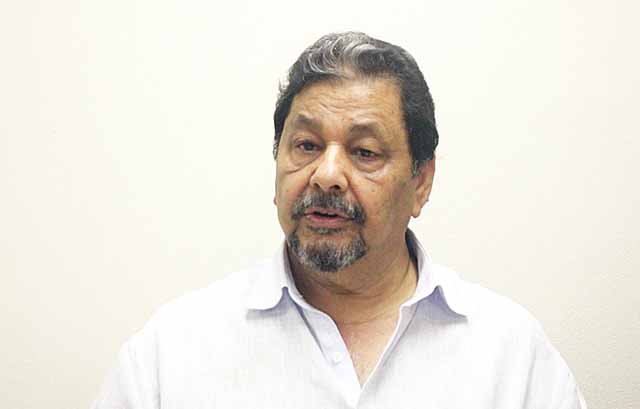By SIBUSISO DLAMINI | 2024-01-23

Swazi Pharm Director Kareem Ashraf has blown the whistle on the health crisis, describing it as 'self-created'.
The crisis, according to Ashraff, was not only about shortages, but also about mismanagement and what he termed ‘criminal negligence’ within the ministry of health.
Ashraf said the situation was critical and therefore, immediate action was imperative to prevent further loss of lives.
The businessman questioned the decision-making processes that perpetuated this cycle, decrying that it leaves companies like Swazi Pharm in a precarious situation.
The heart of his complaint centred on government orders being placed with suppliers lacking stock, often at exorbitant costs, while leaving suppliers with stocked inventory at the agreed-upon tender prices.
Ashraf, who took over ownership of the pharmaceutical distribution company and long-time supplier of medicinal drugs to government last year, made this assertion during a handover event of a donation of E1.8 million worth of drugs to the health ministry, which he said was the company's contribution to dealing with the prevailing lack of crucial medications in public health facilities.
The health crisis has led to a public outcry, prompting government to initiate a forensic audit investigation into alleged irregularities concerning the requisition, acquisition, and distribution of medicinal drugs to public health facilities.
The businessman recognised government's attempts to implement short and long-term strategies, but took a critical turn, exposing what he deemed a 'self-created' crisis.
“We wonder why Emaswati's lives are being put at such risk when medical drugs are stocked at suppliers?” he said.
The businessman said they were troubled that hospitals were grappling with a surge in infant mortality rates when the company was awarded an intensive care tender intended for maternity and ICU use in neonates and infants worth E80 million.
Officials
“After getting the tender, we met government officials in the relevant portfolios to agree on how the medicinal drugs will be supplied to enable us to plan and engage manufacturers in anticipation that drugs must be delivered monthly so government meets its demands,” he said, decrying that a cloud of uncertainty still looms large over the effective utilisation of the neonates even after the significant investment and planning.
“While we diligently held the stock for government, valuable medicines languished because of mismanagement,” he emphasised, stating that this was troubling Swazi Pharm.
“Every month, we receive stock from manufacturers as per the tender and standing arrangements then wait for orders to supply the specific drugs,” he said.
The businessman also stated that the tender process, which was meant to secure sufficient stock with a suitable shelf life and ensure availability to government at a moment’s notice, became a precarious dance with expiration dates.
He noted that government’s failure to order in a timely manner had resulted in aging stock, an incredibly heart-breaking spectacle of wasted lifesaving potential.
“In our pursuit of rectifying Swazi Pharm as a business, we uncovered tales of backstabbing, accusations of corruption and shocking incompetence within the ministry of health,” he further stated.
Ashraf highlighted the need for competent individuals to assess requirements and evaluate suppliers' capacities to meet the escalating demand, disclosing that the company spent E250 000 in July bringing specialists from France to train over 120 medical practitioners from both government and private sectors on the proper utilisation of critical drugs.
“It is unfortunate, however, that the stockpile of life-saving items, including picc lines, umbilical catheters and ET tubes sit dormant in our warehouse due to failure to place necessary orders.”
The director elaborated on the complexities of the medical procurement industry, emphasising that once orders were placed and commitments made to manufacturers, the production and packaging were tailored to government specifications.
“This unique packaging means that the stock intended for government cannot be redirected to the private sector or elsewhere, adding to the frustration of stocked suppliers like Swazi Pharm,” stated Ashraff.
Swazi Pharm was part of the 10 companies that received E45 million emergency tender recently and delivered within 24 hours according to Ashraf.
ASD Medical, the company that was awarded more than 80 per cent of the tender, on the other hand, failed to deliver the much-needed drugs about a month later, despite the tender being an emergency tender.
“Swazi Pharm is urging the head of the procurement committee to intervene urgently,” he said.
Nonetheless, the Swazi Pharm director lauded the new government for the attitude shown and towards alleviating the inadequacies of the health sector and said it was for this reason that the company saw it fit to donate the E1.8 million worth of drugs.
“Please accept our donation and go save Emaswati's precious lives,” he said, making it known that the drugs are set to expire by the end of 2024.
“This is a painful situation as patients in government hospitals are in dire need of these very supplies,” Ashraff added.
Ministry of Health Principal Secretary, Khanya Mabuza, who was in the company of the Director of Health Services, Dr. Velephi Okello and acting Central Medical Stores (CMS) Deputy Director, Thembi Gama, expressed gratitude for Swazi Pharm's generous donation of medicines and supplies.
“I am confident that these will assist patients who need them the most as they seek care in our health facilities,” Mabuza said, emphasising that the donation would go a long way in complementing government's efforts to improve the current situation.
Mabuza said the ministry valued partnerships during this difficult time and appreciated Swazi Pharm's openness. He assured that government had stepped up efforts to address the persistent shortages through implementing several strategies that include short and long-term approaches.
“In the short-term, we are following up the payments of suppliers, improving warehouse systems, and improving digital systems to enhance the security of medicines,” he disclosed.
“In the long-term, we are improving sustainably the governance for the CMS, including procurement systems to ensure efficiencies are attained in the procurement and supply chain management systems," Mabuza said.
share story
Post Your Comments Below

Sisonkhe FC ……........….. (0)2
Mpendulo 55th, Thab...
Social media users have reacted with shock and sorrow to the death of former Mhlume Unite...

THE recent turn of events at SwaziMed has underscored deep-rooted governance challenges that thre...
Health officials have reported a significant decrease in new HIV infections among men, in...
All material © Swazi Observer. Material may not be published or reproduced in any form without prior written permission.
Design by Real Image Internet